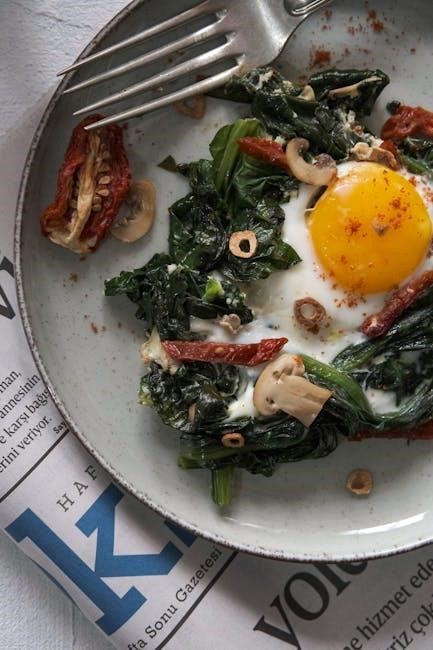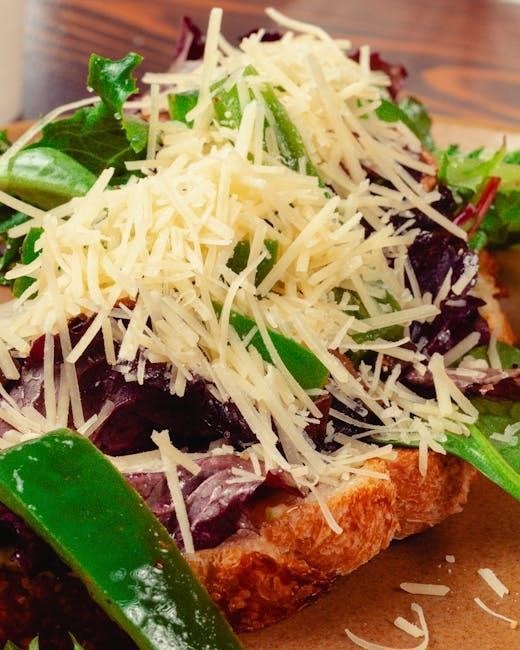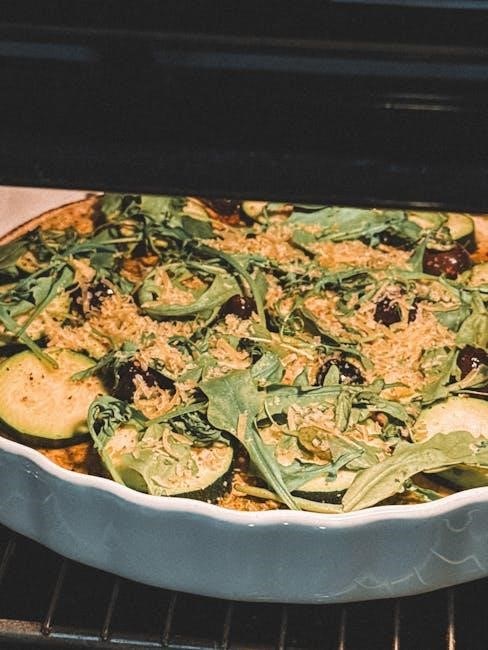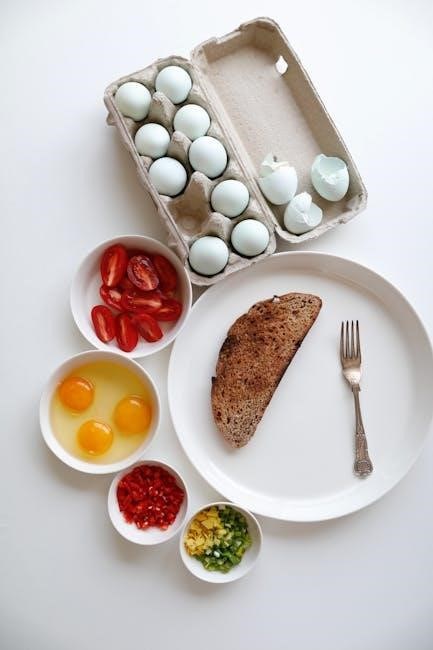
vegetarian bodybuilding meal plan pdf
Vegetarian Bodybuilding Meal Plan PDF: An Overview
Are you a vegetarian looking to build muscle? A well-structured meal plan is essential. A Vegetarian Bodybuilding Meal Plan PDF provides a comprehensive guide, offering tailored nutritional strategies for muscle growth and recovery while adhering to a plant-based diet.

Understanding Vegetarian Bodybuilding
Vegetarian bodybuilding redefines traditional muscle-building approaches. It emphasizes plant-based protein sources. This lifestyle choice enhances energy, improves athletic performance, and promotes inner strength, requiring a refined diet and fitness plan different from conventional bodybuilding methods.
Defining Vegetarian Bodybuilding
Vegetarian bodybuilding is a specialized approach to building muscle and enhancing physical strength while adhering to a vegetarian diet. This means excluding all meat, fish, and poultry from the diet, focusing instead on plant-based protein sources such as legumes, nuts, seeds, tofu, and tempeh. It requires careful planning to ensure adequate intake of essential nutrients, particularly protein, to support muscle growth and repair.
This approach is not just about excluding meat; it’s about strategically incorporating a variety of plant-based foods to meet the specific demands of intense training. Caloric intake and macronutrient ratios must be carefully managed to either gain muscle or lose fat.
Benefits of a Vegetarian Diet for Bodybuilding
A vegetarian diet for bodybuilding offers several advantages. Plant-based diets are often rich in fiber, which aids digestion and helps maintain healthy blood sugar levels, crucial for sustained energy during workouts. They are typically lower in saturated fat and cholesterol, promoting cardiovascular health.
Vegetarian diets are abundant in vitamins, minerals, and antioxidants, supporting overall health and reducing inflammation, which can aid in recovery. Plant-based foods often provide a wider range of micronutrients, enhancing the body’s ability to repair and grow. Many find that a vegetarian diet improves energy levels and mental clarity, benefiting both training and daily life.

Key Nutrients for Vegetarian Bodybuilding
Vegetarian bodybuilding requires careful attention to key nutrients. Prioritize protein for muscle repair, carbohydrates for energy, and healthy fats for hormone production. Meeting these needs supports effective muscle growth and overall well-being on a plant-based diet.
Protein Sources for Muscle Growth
For vegetarian bodybuilders, obtaining adequate protein is crucial for muscle growth and repair. Excellent sources include legumes like lentils, chickpeas, and beans, which offer substantial protein and fiber. Tofu, tempeh, and edamame, derived from soybeans, are also complete protein sources, providing all essential amino acids.
Dairy products, such as Greek yogurt and cheese, are viable options for lacto-vegetarians, offering high-quality protein. Eggs, consumed by ovo-vegetarians, are another excellent protein source. Nuts and seeds, including almonds, chia seeds, and hemp seeds, contribute to protein intake while providing healthy fats and micronutrients.
Incorporating a variety of these protein sources into your daily diet ensures a balanced amino acid profile, supporting optimal muscle development and overall health. Strategically plan your meals to distribute protein intake throughout the day, maximizing muscle protein synthesis and achieving your bodybuilding goals on a vegetarian diet.
Carbohydrates for Energy
Carbohydrates are the primary fuel source for bodybuilding, providing the energy needed for intense workouts and muscle recovery. For vegetarian bodybuilders, selecting the right carbohydrate sources is essential for sustained energy levels. Opt for complex carbohydrates such as whole grains like quinoa, brown rice, and oats, which offer a steady release of energy and are rich in fiber.
Fruits and vegetables are also excellent sources of carbohydrates, providing essential vitamins, minerals, and antioxidants. Starchy vegetables like sweet potatoes and potatoes are particularly beneficial for replenishing glycogen stores after workouts. Legumes, in addition to being protein sources, contribute to carbohydrate intake.
Timing your carbohydrate intake is crucial; consume complex carbohydrates before workouts for sustained energy and simple carbohydrates like fruit after workouts to replenish glycogen. Avoid processed and refined carbohydrates, as they offer minimal nutritional value. Prioritize whole, unprocessed carbohydrate sources to support optimal performance and overall health.
Healthy Fats for Hormone Production
Healthy fats are critical for hormone production, particularly testosterone, which is essential for muscle growth and overall well-being in bodybuilding. Vegetarian bodybuilders must prioritize incorporating sufficient healthy fats into their diet from plant-based sources. Excellent sources include avocados, nuts, seeds, and olive oil.
Avocados provide monounsaturated fats, which support heart health and hormone synthesis. Nuts and seeds, such as almonds, walnuts, flaxseeds, and chia seeds, offer omega-3 and omega-6 fatty acids, vital for reducing inflammation and promoting recovery. Olive oil is another great source of monounsaturated fats, ideal for cooking and salad dressings.
Ensure a balanced intake of omega-3 to omega-6 fatty acids to maintain optimal hormone function and overall health. Avoid excessive saturated and trans fats, which can hinder hormone production and negatively impact health. Prioritize whole, unprocessed sources of healthy fats to support your bodybuilding goals and maintain hormonal balance.

Sample Vegetarian Bodybuilding Meal Plan
A sample vegetarian bodybuilding meal plan offers a structured approach to meeting nutritional needs. It provides a template for daily meals, ensuring adequate protein, carbs, and fats for muscle growth and energy.
One-Day Sample Meal Plan
Let’s explore a one-day sample meal plan blending traditional Indian flavors with bodybuilding essentials. Start with lentil-based dishes, protein-packed paneer, and vibrant vegetables for a nutritious plate. For breakfast, consider oatmeal with peanut butter, banana, and hemp seeds. Lunch could be a quinoa and black bean salad.
A midday snack might include a protein shake with almond milk. For dinner, enjoy a tofu stir-fry with brown rice. Before bed, another protein shake can aid recovery. Add creativity and flavor to meals for a palatable and effective muscle-gaining experience throughout the day. This approach ensures a tasty and nutritious experience.
7-Day Sample Meal Plan
Embark on a week-long journey with a sample vegetarian bodybuilding meal plan. Day one features Greek yogurt with mixed nuts and berries for breakfast, followed by a quinoa and black bean salad for lunch. A protein shake with almond milk serves as an afternoon snack, and tofu stir-fry with vegetables on brown rice completes the day.
Throughout the week, incorporate oatmeal, peanut butter, and hemp seeds for breakfast variety. Consider cheese omelets with vegetables for lunch options. Snacks like protein shakes and mixed nuts support muscle recovery. Dinners can include veggie chili with quinoa and lentil-based dishes, ensuring balanced nutrition for bodybuilding goals.
Creating a Customized Meal Plan
Crafting a personalized vegetarian bodybuilding meal plan involves calculating macronutrient needs. Adjust calorie intake for bulking or cutting phases. This customization supports bodybuilding goals, adhering to a vegetarian diet for optimal results.
Calculating Macronutrient Needs
Determining your ideal macronutrient ratios is fundamental for a successful vegetarian bodybuilding journey. Firstly, calculate your Basal Metabolic Rate (BMR) and activity level to estimate daily calorie requirements. Protein intake is crucial for muscle repair and growth; aim for 1.6 to 2.2 grams of protein per kilogram of body weight, sourcing it from lentils, tofu, and nuts. Carbohydrates fuel workouts and replenish glycogen stores; prioritize complex carbs like quinoa and brown rice.
Healthy fats are essential for hormone production and overall health; include sources like avocados and flaxseeds. Carefully track your intake to ensure you meet your macronutrient targets, adjusting as needed based on your progress and goals. Consider consulting with a registered dietitian for personalized guidance.
Adjusting Calories for Bulking or Cutting
The key to either bulking or cutting as a vegetarian bodybuilder lies in manipulating your caloric intake. For bulking, consume a calorie surplus of approximately 250-500 calories above your maintenance level to promote muscle growth. Prioritize nutrient-dense foods to support muscle development without excessive fat gain. For cutting, create a calorie deficit of 250-500 calories below your maintenance level to facilitate fat loss while preserving muscle mass.
Maintain a high protein intake during cutting to minimize muscle breakdown. Monitor your progress and adjust calorie intake accordingly to achieve your desired physique. Remember that consistency and patience are crucial for successful bulking or cutting phases on a vegetarian diet.

Resources for Vegetarian Bodybuilding Meal Plans
Finding reliable resources is key. Look for PDF meal plans online, or consult with a registered dietitian specializing in vegetarian diets. These professionals can provide personalized guidance and ensure optimal nutrition for your bodybuilding goals.
PDF Meal Plan Availability
Numerous Vegetarian Bodybuilding Meal Plan PDFs are available online, offering diverse dietary approaches. Some focus on Indian flavors, combining lentils, paneer, and vegetables. Others provide vegan options, emphasizing protein from sources like quinoa and mock tuna salad. These PDFs cater to different caloric needs, with examples ranging from 1700-calorie plans to those designed for bulking.
Many resources provide sample meal plans, grocery lists, and daily macro breakdowns. Some plans even offer options to add higher protein carb additions like chickpeas or black beans after workouts. Remember to critically evaluate the sources and customize any plan to your specific needs and preferences. Consulting a registered dietitian can further ensure the chosen PDF aligns with your individual goals and health requirements.
Consulting a Registered Dietitian
Navigating the complexities of a vegetarian bodybuilding diet can be significantly simplified by consulting a registered dietitian. A dietitian can provide personalized guidance, ensuring your meal plan meets your specific macronutrient and micronutrient needs for optimal muscle growth and overall health. They can help you calculate your individual requirements, adjust calories for bulking or cutting phases, and address any potential nutrient deficiencies common in vegetarian diets.
Furthermore, a dietitian can assist in tailoring a meal plan that aligns with your lifestyle, preferences, and any underlying health conditions. They can also offer valuable insights into meal timing, supplement considerations, and strategies for maintaining a balanced and sustainable vegetarian bodybuilding approach. Seeking professional advice empowers you to make informed dietary choices and maximize your fitness potential.